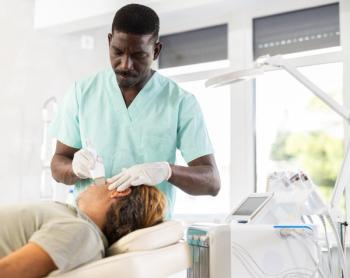
The immune system, four immune-mediated skin diseases and why targeted therapies work
Understanding the immune system and its dysregulation in immune related diseases helps providers understand better what they are clinically seeing in practice as well as how different targeted therapies might block those actions. Participate in this forum.
Understanding the immune system and how it relates to blistering diseases, psoriasis, atopic dermatitis and urticaria helps nurse practitioners (NPs) and physician assistants (PAs) realize why today’s targeted therapies work, according to dermatologist George Martin, M.D.
Dr. Martin, who is program director for the Maui Derm meetings, presented at the Maui Derm NP and PA summer 2018 meeting on cutaneous immunology.
“Once you understand where the molecular problems are, you can see how our targeted therapies work, why they’re so specifically targeted and how we attack different arms of the problem,” Dr. Martin says.
Antibody-mediated pemphigoid and pemphigus
Dr. Martin describes patients with either tense blisters or erosions on their bodies, which are ongoing and not associated with poison ivy or other environmental irritants. Biopsies were obtained for immunofluorescence to help diagnose precisely where the underlying inflammation was taking place in the skin of these patients.
“It is important to understand where the antibody (Immunoglobulin G in these cases) is bound and where complement is fixed and where inflammation is taking place,” he says. “Knowing this will help explain what we are seeing clinically and how best to proceed with therapy.”
Circulating IgG is the major constituent in the antibody-based adaptive arm of the immune system’s fight against invading pathogens. Complement, important in acute and chronic inflammation, is a network of circulating proteins that augment the action of membrane bound antibodies, such as IgG, and help recruit phagocytes during immune response.
In this case of numerous erosions/ulcerations of the skin, immunofluorescence showed the deposition of specific IgG antibodies against desmoglein 3, a keratinocyte cell surface adhesion protein associated with desmosomes. Desmosomes are the attachment filaments between epidermal cells. Disrupting them results in disconnection of epidermal cells from each other and sloughing of the epidermis leading to erosions and ulceration.
“This explains clinically why in cases of pemphigus vulgaris, we see erosions and ulcerations on the skin-not intact blisters,” according to Dr. Martin.
In the case of bullous pemphigoid that was presented, IgG auto-antibodies against the bullous pemphigoid antigen located at the basement membrane of the epidermis were found. The resulting inflammation resulted in separation of the epidermis from the dermis (sub-epidermal blister) and formation of intact blisters.
Dr. Martin is treating one of his patients with pemphigoid vulgaris with rituximab, which he says lowers the patient’s auto-antibodies against desmoglein 3. He uses serum test available at specialty labs to monitor antibody levels and determine how the patient is responding to the drug.
There’s an irony to antibody-mediated immunity, Dr. Martin says.
“This is a B-cell driven disease, making antibodies against a specific protein in the skin. Unfortunately, that protein is a normal protein, so somehow the B-cells didn't get the message this is a normal skin constituent. Instead, in these patients, antibodies produced by B-cells attack that protein which blows up the skin,” he says. “Because it is a systemic auto-immune disease you have to use systemic therapies … to suppress the immune system in these cases.”
There are direct and indirect targets for B-cells. Rituximab, used to treat lymphoma, targets CD20, which is located on the surface of some but not all B-cells.
“CD20 [is] not found on stem cells, so, fortunately you don't knock out the stem cells. It's not found on early pre-B-cells, and at the other end of the spectrum, it's not found on anti-body producing plasma cells. But it affects enough of the remaining B-cell lineage to dramatically impact antibody production,” Dr. Martin says.
Rituximab is given as an infusion, and it has been recently approved by the US Food and Drug Administration (FDA) for the treatment of pemphigus, he says.
Dendric cell/T-cell mediated psoriasis
Researchers have found that staph, candida and other pathogens trigger toll-like receptor 2 (TLR 2) located on dendritic cells.
“Dendritic cells release [interleukin-] IL-23, the ‘master cytokine,’ resulting in development and expansion of pathogenic Th17 cell clones that produce IL-17. IL-17 is a pro-inflammatory cytokine that drives inflammation in the skin. Th-17 cells also produce IL- 22, which causes the skin to thicken,” Dr. Martin says.
There are a host of IL-17 blocking medications on the market.
Since dendritic cells produce IL-23, causing and maintaining Th17 cell clonal expansion, drugs like ustekinumab, which blocks IL-23 and IL-12, and the IL-23 blockers tildrakizumab, guselkumab and risankizumab also help to knock out that proliferation and patients’ skin improves.
“We now have specific IL- 23 blockers that are have come to market. We have two approved and one ready to be approved in psoriasis,” he says. “We’re seeing incredible results with these drugs. They’re very powerful.”
Th-2 T-cell mediated atopic dermatitis
Severe atopic dermatitis most commonly starts in predisposed people who have a genetic defect in their skin barrier. Ongoing exposure to allergens or irritants that penetrate through the defective skin barrier or skin trauma trigger the disease state, according to Dr. Martin.
“The antigen is engulfed by the dendritic cell, which goes to the lymph node, sensitizes naive T-cells, and patients get the Th2 cell response,” he says. “When Th2 cells respond, they make IL-4 and IL-13, which triggers B-cells to produce IgE. That’s why atopic dermatitis patients often have huge IgE levels. The Th2 cells also make IL-31, which when it hits a sensory neuron triggers itch like crazy.”
“IL- 4 and IL-13 play an important role in the pathogenesis of atopic dermatitis. They share a common receptor subunit IL-4 alpha. If you make an antibody against the IL-4 alpha subunit, you can block both IL-4 and IL-13 components of the atopic dermatitis cascade and these patients will improve,” he says.
Dupilumab, an IL-4 alpha receptor blocker, is the only approved targeted therapy for atopic dermatitis patients 18 years an older, according to Dr. Martin.
IgE in allergy and chronic urticaria
First time exposure to an allergen results in IgE production against that allergen and attachment of the IgE to mast cells. A second exposure to that same allergen cause an immediate release from mast cells of histamine, tumor necrosis factor (TNF)-alpha, proteases and heparin, which result in sneezing, nasal congestion and urticaria. During the following minutes and hours, the body produces lipid mediators and IL-4, IL-5 and IL-13 cytokines, while recruiting eosinophils.
In chronic urticaria, there’s an ongoing IgE-dependent release of inflammatory mediators from mast cells and basophils. Omalizumab blocks IgE binding to mast cells thereby preventing release of histamine and other inflammatory mediators. This helps to clear severe cases of skin edema, itching and irritation related to urticaria, according to Dr. Martin.
One’s understanding of the immune system and its dysregulation in immune related diseases explains not only what providers clinically see in dermatology practice but how today’s therapies might block those actions, according to Dr. Martin.
Newsletter
Like what you’re reading? Subscribe to Dermatology Times for weekly updates on therapies, innovations, and real-world practice tips.











